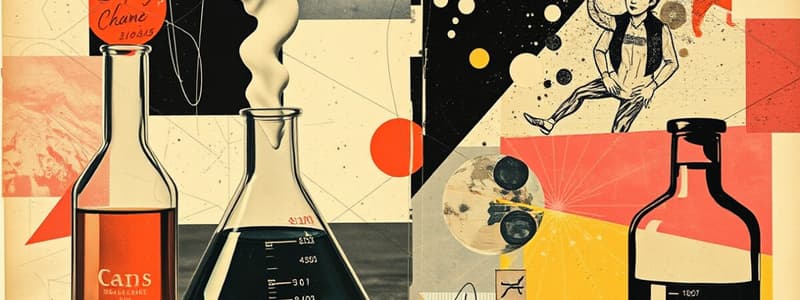Podcast
Questions and Answers
What is the definition of Matter?
What is the definition of Matter?
- Hard and brittle
- Anything that has mass or takes up space (correct)
- Fluid, atoms move around, fill up things
- Amount of stuff in an object
What does Mass refer to?
What does Mass refer to?
Amount of stuff in an object
Describe Solids.
Describe Solids.
Hard and brittle
What are Liquids?
What are Liquids?
Explain Gases.
Explain Gases.
What does BEC stand for?
What does BEC stand for?
What are Atoms?
What are Atoms?
Define Molecules.
Define Molecules.
What is an Ion?
What is an Ion?
What are Cations?
What are Cations?
What are Anions?
What are Anions?
What is the Atomic Number?
What is the Atomic Number?
What is the Periodic Table?
What is the Periodic Table?
Define Families in the context of chemistry.
Define Families in the context of chemistry.
What does Dissociated mean?
What does Dissociated mean?
What is Biochemistry?
What is Biochemistry?
What is a Steroid?
What is a Steroid?
What is an Amino Acid?
What is an Amino Acid?
What is Organic Chemistry?
What is Organic Chemistry?
Flashcards
Matter
Matter
Anything that has mass or occupies space.
Mass
Mass
The quantity of matter in an object; often confused with weight.
Solids
Solids
Have a defined shape, hard, and brittle; particles are closely packed.
Liquids
Liquids
Signup and view all the flashcards
Gases
Gases
Signup and view all the flashcards
Bose-Einstein Condensate (BEC)
Bose-Einstein Condensate (BEC)
Signup and view all the flashcards
Atoms
Atoms
Signup and view all the flashcards
Molecules
Molecules
Signup and view all the flashcards
Ions
Ions
Signup and view all the flashcards
Cations
Cations
Signup and view all the flashcards
Anions
Anions
Signup and view all the flashcards
Study Notes
Matter and Its Properties
- Matter: Anything that has mass or occupies space. Fundamental concept in physics and chemistry.
- Mass: Refers to the quantity of matter in an object; a basic measure often confused with weight.
States of Matter
- Solids: Have a defined shape, are hard, and brittle; particles are closely packed and vibrate in fixed positions.
- Liquids: Take the shape of their container; atoms are more mobile compared to solids, allowing them to flow.
- Gases: Fill the available space; molecules are far apart and move freely, rarely interacting with each other.
Special States
- BEC (Bose-Einstein Condensate): State where atoms are close together but possess less energy than in solids; exhibits unique quantum phenomena.
Atomic Structure
- Atoms: The fundamental building blocks of matter; consist of protons, neutrons, and electrons.
- Molecules: Formed when two or more atoms are connected by chemical bonds; can represent compounds or elements.
- Ions: Atoms that have gained or lost electrons, resulting in a charge; crucial in chemical reactions.
Types of Ions
- Cations: Positively charged ions formed by losing electrons.
- Anions: Negatively charged ions formed by gaining extra electrons.
Chemical Fundamentals
- Atomic Number: Represents the number of protons in an atom; determines element identity.
- Periodic Table: Organized chart of elements, arranged by atomic number and grouped by shared properties.
Chemical Grouping
- Families: Columns in the periodic table where elements share similar chemical properties and behaviors.
Chemical Processes
- Dissociated: Refers to the process in which molecules split into individual atoms, crucial in chemical reactions.
Interdisciplinary Science
- Biochemistry: The study bridging biology and chemistry, focusing on the chemical processes within living organisms.
- Steroids: Hormones found within animals; play essential roles in various biological functions.
- Amino Acids: Building blocks of proteins; vital for cellular structure and function.
Organic Chemistry
- Organic Chemistry: The branch of chemistry that studies carbon-containing compounds, emphasizing the diversity and functions of organic molecules.
Studying That Suits You
Use AI to generate personalized quizzes and flashcards to suit your learning preferences.




